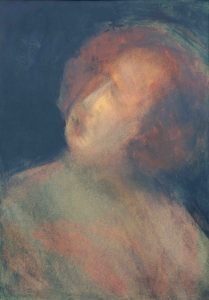Witold Urbanowicz

Witold Urbanowicz, Self-portrait, 2000
Witold Urbanowicz (pseud. Vito Vandost) is a Pallottine priest and self-taught artist. He was born in 1945 in Zarzecze Jeleniewskie in the Suwalki’s region (north-eastern Poland) of farmer parents. In 1962 he began his novitiate, and in 1964 he started his studies in philosophy and theology, quickly interrupted by the obligatory military service. In 1967, he returned to the seminary and resumed his studies, crowned by a master’s thesis focused on art and architecture. Already during his studies, he directed the student theatre “Pallotino-drama”. There he produced various plays, including “Day of Wrath” by Roman Brandstaetter, which was banned by the state authorities and “As if there was no hope” inspired by Saint-Exupéry, prohibited by the authorities of the seminary. During the 70s and 80s, he traveled a lot – among his other adventures, he took part in the first Polish expedition to the sources of Nile in Rwanda. In 1972, he received his ordination, but already before his consecration, he received a proposal to work for the Pallotines’ publishing house (Éditions du Dialogue) in Paris. He worked there until 1992, being responsible for technical aspects and the graphic presentation of Éditions du Dialogue’s publications and the monthly magazine “Our family”. He realized models of some thirty books and albums, including “The Book of Job” and “The Book of Revelation” translated by Czeslaw Milosz and illustrated by Jan Lebenstein, or a series of albums about the travels of Pope John Paul II. Ubranowicz settled at rue Surcouf at a time when the Pallotines Centre of Dialogue played an important spiritual, intellectual and political role in the life of the Polish community in Paris. It attracted the intellectual, artistic and political elite among which Czeslaw Milosz, Andrzej Wajda, Krzysztof Zanussi, Lech Walesa, Jozef Czapski, Zofia and Kazimierz Romanowicz or Jan Lebenstein and Alina Szapocznikow… Thus Ubranowicz found himself in the very heart of this tingle of personalities and the subsequent intellectual and artistic effervescence. This milieu strongly influenced him, making him at the same time a precious witness of that period, to which he gave his testimony while working with Agnieszka Holland during the state of siege in Poland, on a documentary presenting the review Kultura and Jozef Czapski.
Urbanowicz has always been sensitive to art in all its forms. His sensitivity was first shaped by the landscapes of his childhood region of Suwalki and later developed thanks to many experiences and encounters. Creating is for him an inner need, but in 1975 he refused the proposal to enter at Fine Arts Academy, preferring to learn by himself. Although he combines his vocation of an artist with his deep faith and the service of God, he does not create only to sacred art, even if it occupies indeed a large place in his creation. In his works, often painted in acrylic or pastels, we also find landscapes, nudes, erotic scenes, portraits, genre scenes. He is also the author of dozens of drawings, sculptures, projects of statues, stained glass windows, engravings, photographs… In 1985-86, he also realized The Way of the Cross for the Saint Martin Church in Herblay and a sculpture of Christ for the Chapel of the Pallotines House in Osny. A few years later, he made a short film for the exhibition InterGrafik in Paris. In 1980, he dubbed the Father Pio’s voice in the Polish version of the movie about his life. In 1983, the Committee for the Construction on the Memorial to the Victims of Katyn and Communism in New York awarded him a distinction for his monument project.
